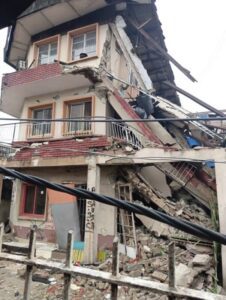Power failure: Dealing with the sectoral leakages from the background
The subject of corruption is one deficient character of governance in the political administration of the Nigeria polity. The expanding wings of the escapades are themselves subjects of broad discourse which have extended their tentacles with sprouting branches to offshoot into categorical phenomena. The walking train of corruption profile in the Country has grown beyond the circles of government institutions with its seeds and resonating effects resounding across the character of sectoral architectures in the Country.
The expanding wings of corruption have no doubt left footprints in the fabrics of working sectors in the Country. While the menace may be a culture whose root resides in public offices, its extension to the society at large has left a situation of socio-cultural decay, as the reign of psychological patterns of corruption syndrome has become an endemic formation which has eaten deep into the fabrics of the Country’s social definition. While corruption continues to reign in public offices, its effects on both private and public domain have continued to brandish the rod of disturbances across sectors. The diversion of funds meant for infrastructure development to boost economic activities towards making conditions of living responsibly palatable, has become a tale of lamentations with records of reducing virtually all fundamental sectors of the economy to the precipice of infantile status.
One sector which has suffered the fate of corruption with deepened leakages of high profile diversion of funds which have largely remained unaccounted for is the power sector. The infantile state of the sector appears not to have exhibited any reasonable growth commensurate to the level of funds injected into it for the development of power architecture over the years. It is a clear fact that the larger chunk of resources directed towards enhancing the infrastructural architecture of the sector has largely ended up in the well of systemic leakage of laundering and diversion. The sector is apparently one of the hardest hit sectors which have suffered soporific blow from the fist of corruption in the Country.
The Socio-Economic Rights and Accountability Project (SERAP) had on Wednesday called on President Muhammadu Buhari to investigate all the alleged missing N11 trillion funds allocated for the execution of electricity projects since 1999. SERAP’s Deputy Director, Oluwadare Kolawole, who raised the call during a press conference, contended that despite President Buhari’s promise to intensify the fight against corruption, access to regular electricity supply has become almost non-existent, due to systematic and widespread corruption in the sector.
In an address titled: ‘Little to No Progress: Stopping Grand Corruption and Impunity in Nigeria,’ the organisation called on the National Assembly to publish the reports of all power sector-related probes to the Federal executive and civil society organizations for necessary advocacy action and prosecution by relevant anti-corruption agencies. The organisation also requested the World Bank President, Mr. David Malpass to release information and documents relating to spending of funds approved and released to Nigeria between 1999 and 2020 to improve access to regular and uninterrupted electricity supply including copies of supervision reports, periodic reviews and other appropriate reports by the bank.
The call of note read, “President Buhari should urgently address corruption in the electricity and education sectors by instructing appropriate anti-corruption agencies to investigate the allegations of missing N11trillion in the electricity sector since the return of democracy in 1999, and to ensure that suspected perpetrators of corruption are brought to justice and that any missing public funds are fully recovered. Undertake a thorough, impartial and transparent investigation into the power sector privatization to publish the details of ownership of public stakes of 40 per cent in those entities, and should ensure that government public resources are not used to subsidize private entities.”
The endemism of corruption has for long continued to strangle vital sectors of the economy in the Country. The power sector has not in any way been spared. The sector has continued to suffer the outcome of mismanagement, misappropriation, and diversion of funds which the systemic leakages in Nigeria’s public finance architecture has left open. The centrality of power to the efficacy of economic performance is incontestable, as larger part of the production chain bears link to the workings of power requirement.
It is instructive, therefore, that if there would be better narrative for economic productivity in the Country, there must be a drastic turn in the narrative of the profile of power supply in the Country. The prevailing situation of systemic deficiencies which has left a sour taste in the mouth of Nigerians demands forceful redress.
It is clear that the unfortunate narrative which has befallen several intervention funds towards vitalising the power sector is more of a result of systemic deficiencies. It is therefore imperative for the Government to shift from the prevailing patterns of working architecture that characterise the structures of public finance in the execution of projects in the power sector among others in the Country. The need to further redefine the system of implementation and monitoring of projects is sine qua non to guide against continuous wastage of resources without headway of remarkable development in the sector. Power is key to the running of the economy. Expectations towards revamping the economy to the status of virility, cannot forcefully be attained with the prevailing epilepsy and operational disarray of the power sector. The time for the Government to redirect the working course towards addressing the architecture of the sector is therefore significant and such would become realistic only when the structural leakages strangling the sector are dealt with from the background.




